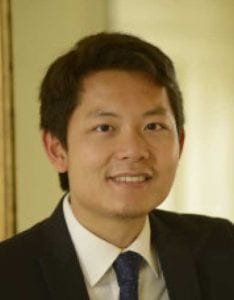Photo: Team 44.01 (James Woolner is the tallest at the back and Sulaiman Al Mani is to his left)
James Woolner and Sulaiman Al Mani
Two of our CHEMMAT alumni, James Woolner and Sulaiman Al Mani are a part of 44.01, a start-up that recently won the Earthshot Prize, probably the world’s most prestigious environmental award. James’ aluma mater, LanzaTech, was also a finalist in their same category, meaning that James worked on 2 of the 3 nominated technologies for their award!
The awards were produced and shown on the BBC, presented by Prince William, as well as other distinguished guests. You can view it on the BBC iPlayer, and it should be up on YouTube soon.
It is so great to hear of two CHEMMAT graduates developing technology that is being recognised on a global scale.
Congratulations James and Sulaiman on an outstanding result. We are proud of you both!
Amelia Rentzios
Amelia Rentzios is a CHEMMAT graduate. She mentions it in the podcast. Her first job was with an international cosmetic company in New York before joining the oil and gas company. Amelia is now Head Of OperationsHiringa Energy Ltd.

Dr Gerda Kuschel
Hospitals’ slow coal switch: ‘Health is the largest carbon emitter in public sector’
Dr Gerda Kuschel did both her BE and PhD in CHEMMAT. She is now Director and Senior Specialist, Emission Impossible Ltd.
How cars take lives in more ways than just crashes
Gerda Kuschel, Hapinz lead researcher and chemical and materials’ engineer, says, “We didn’t know how bad it was. The total number number of deaths is still horrifying.
“But at least we’re now aware of what is truly going on, and I would hope to see that number reduce.”
Avoid, shift, and improve
Kuschel says that in New Zealand the framework for tackling car pollution is “avoid, shift, improve.”
“If you can avoid the trip, you do that; if you can shift to transport that is less polluting, that’s good; and if you can’t, you try and improve efficiency—such as taking a diesel bus and making it electric.”

Kevin Wickham
Kevin Wickham is a CHEMMAT graduate.
NZ Herald, Saturday, 29 October 2022

Dr Thomas Hyde
PODCAST CIO Leadership Live with Executive Director and Chief Digital Officer Thomas Hyde of Beca
Opportunities for engineers
“Digital twin technology is taking engineering to another level, resulting in better infrastructure outcomes that are more rapidly delivered,” says Beca’s Chief Digital Officer Dr Thomas Hyde CMEngNZ.
https://www2.cio.co.nz/article/702381/cio50-2022-18-thomas-hyde-beca/

Sarah Blyde
The women at the forefront of New Zealand’s space industry.
Sarah Blyde is a CHEMMAT graduate.

Dr Robert Hoye
Materials – Harvesting energy from indoor lighting
Dr Robert Hoye, from the Department of Materials, is developing a new generation of materials for harvesting indoor light to sustainably power the Internet of Things.
Robert is developing new materials to harvest the energy from indoor lighting to power other devices around the home or buildings.
“Receiving the ERC Starting Grant is a great honour and a dream fulfilled.”
The Internet of Things refers physical objects that are fitted with sensors, software or other technologies that are connected to the internet and share data. We are increasingly using more of these smart devices in our homes, offices, and public buildings. However, the batteries they use can deplete quickly, creating practical and sustainability challenges.
Robert’s project aims to develop technology to harvest energy from indoor lighting to power the devices, in a similar way to how solar panels harvest energy from sunlight. This is known as photovoltaics.
He explained: “Most people will have come across this design in solar- and battery-driven calculators. But whilst a calculator only requires a microwatt of power, typical IoT devices require a milliwatt of power or more. Whilst indoor lighting can provide sufficient levels of power, current commercial-standard indoor photovoltaics, made from amorphous silicon, are not able to harvest enough of this power due to their low efficiencies.”
Robert and his collaborators have discovered that new green materials currently being developed for next-generation solar panels could be useful for indoor light harvesting. The ERC grant will help him to explore and develop methods to manufacture these photovoltaics at scale with low environment impact.
He said: “Receiving the ERC Starting Grant is a great honour and a dream fulfilled. The ERC is one of the only funding streams that allows me to pursue risky, blue-skies research, and provide me with the resources to truly tackle the challenge of developing these new materials to fulfil their potential.”
Robert is working with collaborators from Cambridge, France’s CNRS, TUM in Germany and Jyväskylä in Finland.


Aparajita Goswami
Aparajita Goswami did both her BE Hons (2015) and ME (2016) in CHEMMAT.

Greg Jarvis
Best for Bluelab in business export awards | NBR
Bluelab CEO Greg Jarvis is a CHEMMAT graduate, final year 1984.

Warren Thomas
Warren Thomas, graduate from the first batch of CHEMMAT crops around 1969… it’s well worth a look at a fantastic project Warren has been involved in…

Robert Spurway
Robert Spurway is a CHEMMAT graduate. He was previously with Fonterra and now works for GrainCorp. He has given guest lectures in RDK’s design course.
Russia-Ukraine war a problem for ‘feeding the world’ (24 April, 2022)
“The war in Ukraine looks set to disrupt grain production for possibly ‘a number of years’ to come,” says GrainCorp CEO Robert Spurway.

Mark Pattenden

Graeme Hill
Ken is a CHEMMAT graduate from the early 1970’s.
Ken Holyoake

Fiona Bycroft
Fiona Bycroft is a CHEMMAT graduate.

